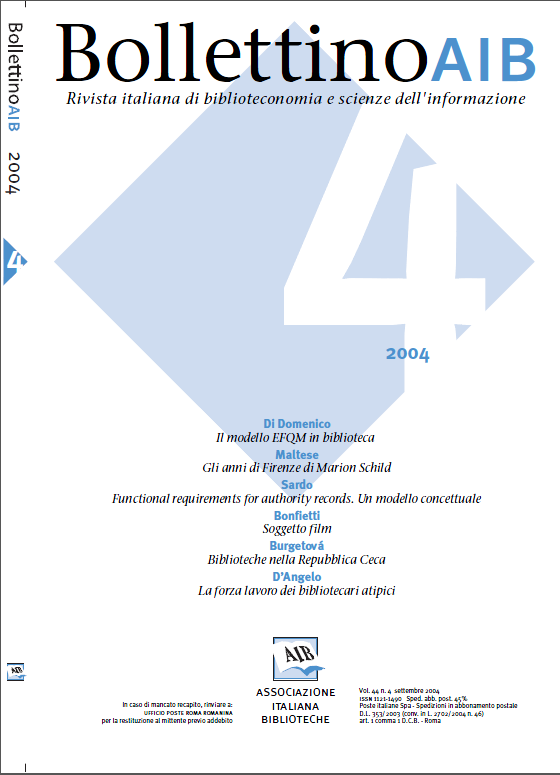Marion Schild's Florentine years
Main Article Content
Abstract
In order to fulfil the obligations imposed by a law of 1965, the Library of the United States' Congress had launched a vast programme of purchasing and cataloguing regarding what is published worldwide of interest to study. The programme, known as the "shared cataloging program", required the cooperation of the American research libraries and of many foreign national libraries in which a national bibliography was produced.
Italy was included from the outset in the list of countries from which, due to the characteristics and quality of the respective national bibliographies, the Congress Library would have sought cooperation for the development of the programme; but the participation of the Italian National Bibliography was formalized only from 1968. The central National Library of Florence undertook to provide the Congress Library, every week, with a copy of the registrations prepared for the Italian National Bibliography, complete with others, concerning current publications, still not arrived because of press rights, but purchased on behalf of the American libraries by the book agent that has an agreement for Italy. Cooperation in the programme would have given the Italian National Bibliography the chance to offer richer and more precise information on the country's publishing production and to carry out a more effective and timely control over the delivery of the due examples.
Cooperation between the two libraries continued, with full mutual satisfaction, up to and including 1984. The organization and management of the specially created office in Florence was entrusted to an interesting figure of the world of libraries, Marion Schild. She was seconded from the Congress Library for six years. A year after his death she is remembered for the unique quickness of his wit and his rich personality which, together with an articulated professional formation and marked organizational skills, earned him gratifying awards throughout the entire span of his long and active existence.
Italy was included from the outset in the list of countries from which, due to the characteristics and quality of the respective national bibliographies, the Congress Library would have sought cooperation for the development of the programme; but the participation of the Italian National Bibliography was formalized only from 1968. The central National Library of Florence undertook to provide the Congress Library, every week, with a copy of the registrations prepared for the Italian National Bibliography, complete with others, concerning current publications, still not arrived because of press rights, but purchased on behalf of the American libraries by the book agent that has an agreement for Italy. Cooperation in the programme would have given the Italian National Bibliography the chance to offer richer and more precise information on the country's publishing production and to carry out a more effective and timely control over the delivery of the due examples.
Cooperation between the two libraries continued, with full mutual satisfaction, up to and including 1984. The organization and management of the specially created office in Florence was entrusted to an interesting figure of the world of libraries, Marion Schild. She was seconded from the Congress Library for six years. A year after his death she is remembered for the unique quickness of his wit and his rich personality which, together with an articulated professional formation and marked organizational skills, earned him gratifying awards throughout the entire span of his long and active existence.
Article Details
Section
Articles

This work is licensed under a Creative Commons Attribution-ShareAlike 4.0 International License.
